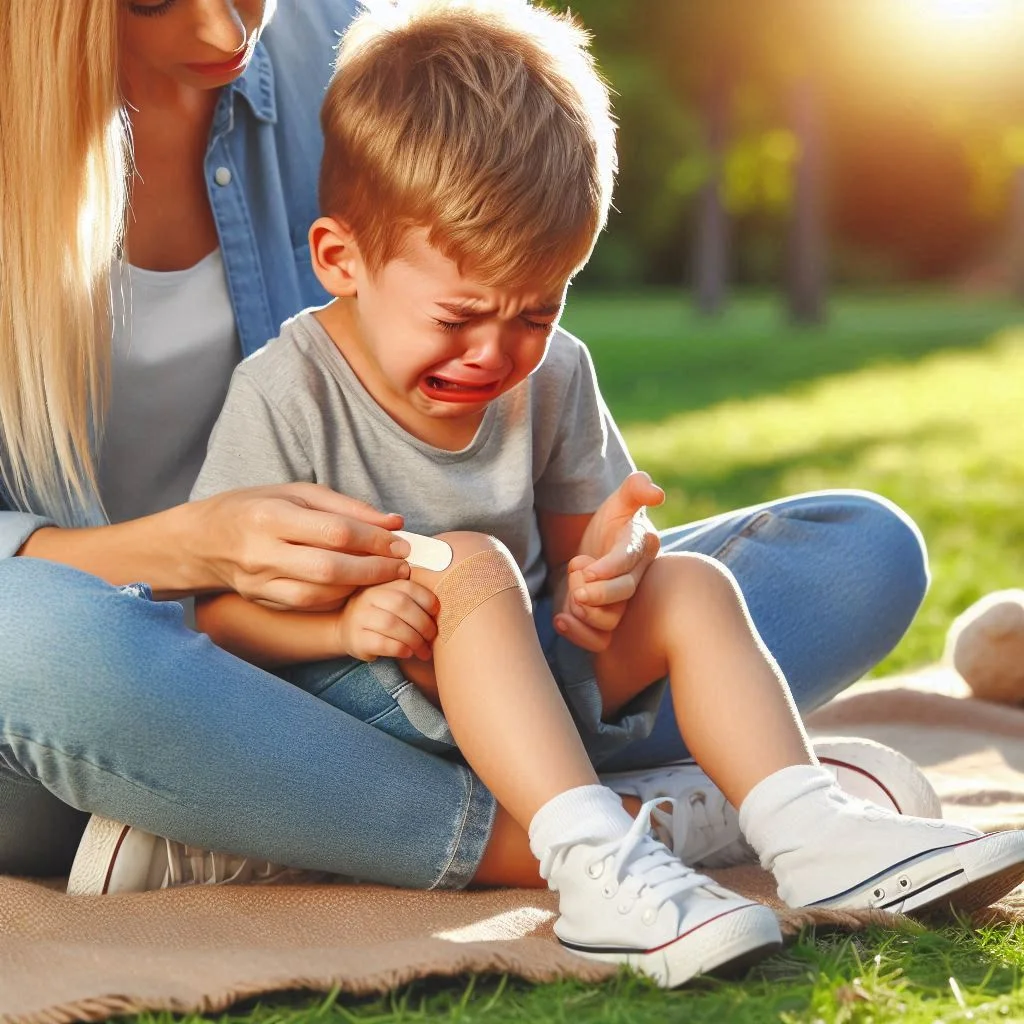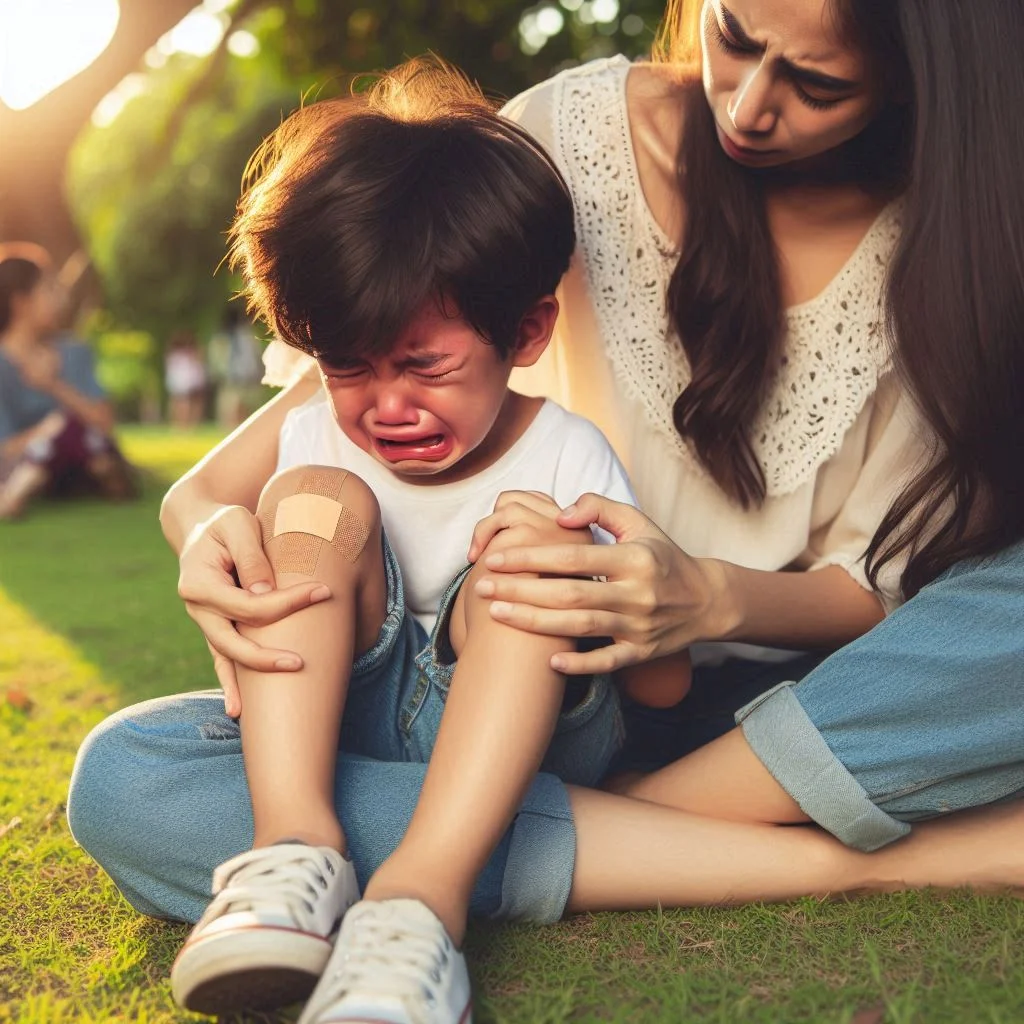Dreams are fascinating and often enigmatic experiences that provide insight into our subconscious thoughts and emotions. One particularly distressing type of dream involves seeing a child—especially your own—getting hurt. Such dreams can be profoundly unsettling and provoke intense feelings of anxiety and concern. Understanding the underlying meanings and implications of these dreams can offer valuable insights into our mental and emotional states. This article explores various interpretations and psychological perspectives on dreams about your child getting hurt.

Table of Contents
Emotional Context and Parental Anxiety
Dreams involving harm to a child can be especially troubling for parents. Such dreams often reflect deep-seated fears and anxieties about their children’s safety and well-being. They can arise from a parent’s natural worry about their child’s vulnerability and the potential dangers they might face. The emotional intensity of these dreams can be attributed to the strong bond between a parent and child, making the prospect of harm even more distressing.
The Role of Parental Instincts
Parental instincts are a powerful force that drives a parent’s concern for their child’s safety. This instinct can manifest in dreams as vivid scenarios where the child is in danger or injured. Such dreams may reflect a parent’s heightened sensitivity to their child’s needs and subconscious processing of their fears. Understanding this connection can help parents acknowledge that these dreams are a natural part of their protective instincts and are not necessarily indicative of real-life threats.
Stress and Overwhelm
The stress and demands of parenting can also contribute to dreams about a child getting hurt. Parents who are overwhelmed by responsibilities, balancing work and family life, or dealing with challenging situations may experience such dreams as a manifestation of their stress. The subconscious mind may use these dreams to process and cope with the pressures and uncertainties associated with parenting.
Symbolic Interpretations
Dreams often use symbolic language to convey deeper meanings. For example, in the context of a dream about a child getting hurt, various symbolic interpretations can offer insights into what the dream might signify about one’s life and emotions.
Fear of Loss or Failure
A dream about a child getting hurt may symbolize underlying fears of loss or failure. For parents, this fear could be related to concerns about not being able to protect their children adequately or failing to meet their expectations. Such dreams may reflect a parent’s anxiety about their ability to fulfill their role and responsibilities effectively.
Vulnerability and Insecurity
Children often represent innocence, vulnerability, and purity. Dreaming about a child getting hurt can symbolize feelings of insecurity or vulnerability within oneself. It may indicate that the dreamer is grappling with their fears or insecurities that are projected onto the image of the child. Understanding this connection can help individuals address their personal issues and emotional challenges.
Unresolved Issues and Guilt
Dreams involving harm to a child can also arise from unresolved issues or feelings of guilt. Parents who are struggling with guilt over past decisions or actions may project these feelings onto their dreams. The child in the dream may represent a part of themselves that they feel they have neglected or harmed in some way. Exploring these feelings and seeking resolution can be beneficial for emotional healing.
Psychological and Emotional Implications
Dreams about a child getting hurt can have significant psychological and emotional implications. It is essential to recognize these implications and understand how they can affect one’s mental well-being.
Impact on Parental Well-being
Repeated dreams about a child getting hurt can impact a parent’s overall well-being. The emotional distress caused by such dreams can lead to increased anxiety and stress levels. Parents need to address these feelings and seek support if required. Talking to a mental health professional or counselor can provide valuable guidance and coping strategies.
Relationship Dynamics
Dreams about a child getting hurt can also affect the dynamics within a family. Parents who are preoccupied with these dreams may experience heightened stress and anxiety, which can impact their interactions with their children and other family members. Parents need to communicate openly with their partners and seek support to maintain healthy relationships and manage their emotions effectively.
Practical Steps and Coping Strategies
While dreams about a child getting hurt can be distressing, there are practical steps and coping strategies that can help individuals manage their emotions and gain a better understanding of their dreams.
Keeping a Dream Journal
Keeping a dream journal can be a valuable tool for understanding recurring dreams and their potential meanings. By recording the details of the dream and any associated emotions, individuals can identify patterns and gain insights into their subconscious thoughts. This practice can also help in processing and addressing any underlying fears or concerns.
Self-Reflection and Emotional Awareness
Engaging in self-reflection and developing emotional awareness can help individuals address the root causes of their distressing dreams. Exploring personal fears, insecurities, and unresolved issues can provide clarity and aid in emotional healing. Practicing mindfulness and relaxation techniques can also help manage stress and anxiety.
Seeking Professional Support
If dreams about a child getting hurt are causing significant distress or impacting daily life, seeking professional support may be beneficial. Mental health professionals, such as therapists or counselors, can provide guidance and support in understanding and addressing underlying issues. They can also offer coping strategies and techniques for managing anxiety and stress.
Conclusion
Dreams about a child getting hurt can be profoundly unsettling and evoke strong emotional responses. Understanding the potential meanings and implications of these dreams can offer valuable insights into one’s emotional state and psychological well-being. By exploring the connections between these dreams and underlying fears, anxieties, and unresolved issues, individuals can gain a better understanding of their subconscious mind and take steps toward emotional healing and well-being. Remember that dreams are a natural part of the human experience, and seeking support when needed can help you navigate and manage their impact on your life.
Understanding the Meaning and Addressing the Anxiety
Dreams can be mysterious and often unsettling, especially when they involve our loved ones. One of the most distressing dreams a parent can have is about their child getting hurt. These dreams can evoke strong emotions, leaving parents anxious and worried. However, understanding such dreams’ potential meanings and psychological underpinnings can provide some comfort and insight. This article will delve into the various interpretations, common themes, and ways to address the anxiety caused by these unsettling dreams.

The Nature of Dreams
Before diving into the specific dream of a child getting hurt, it’s essential to understand the nature of dreams. Dreams are a natural part of the sleep cycle, primarily during the Rapid Eye Movement (REM) stage. They are thought to be a way for the brain to process emotions, memories, and experiences. While some dreams can be pleasant or even mundane, others can be vivid and distressing, especially those involving harm to a loved one.
Common Interpretations
- Parental Anxiety: One of the most straightforward interpretations of a dream about your child getting hurt is parental anxiety. Parents naturally worry about their children’s safety and well-being. Such dreams can be a manifestation of these fears, reflecting concerns about potential dangers or the desire to protect one’s child from harm.
- Symbolic Representation: Dreams often use symbolism to convey deeper meanings. A dream about a child getting hurt might not be about the child per se but could symbolize a fear of loss, vulnerability, or change. It could represent a significant change in the child’s life, such as starting school, moving to a new place, or even growing up.
- Unresolved Issues: Sometimes, dreams can be a way for the subconscious mind to process unresolved issues or traumas. If a parent has experienced past trauma or has unresolved fears, these emotions can surface in dreams, taking the form of their child getting hurt.
- Guilt or Self-Doubt: Parents often experience guilt or self-doubt regarding their parenting abilities. A dream about a child getting hurt could reflect these feelings, indicating a fear of not being a good enough parent or failing to protect their child.
About Children Getting Hurt
- Accidents: Dreams involving accidents, such as falling, drowning, or getting hit by a car, are common. These dreams can represent fears about the unpredictability of life and the potential for sudden harm.
- Illness or Injury: Dreams where a child becomes ill or injured can reflect concerns about health and well-being. These dreams might be more prevalent if the child has recently been sick or has health issues within the family.
- Separation or Abandonment: Dreams about losing a child or being separated from them can signify fears of abandonment or losing control. These dreams might be linked to a parent’s own experiences with separation or loss.
- Dangerous Situations: Dreams where a child is in a hazardous situation, such as being kidnapped or in a fire, can symbolize a parent’s fear of external threats. News stories or personal experiences might influence these dreams.
Psychological Perspectives
- Freudian Theory: According to Sigmund Freud, dreams are a window into the unconscious mind. He believed that dreams reflect repressed desires and unresolved conflicts. In the context of a child getting hurt, Freud might interpret this dream as a manifestation of deep-seated fears or anxieties that the parent has not consciously acknowledged.
- Jungian Theory: Carl Jung, another prominent psychologist, viewed dreams as a way to communicate with the unconscious mind. He believed that dreams use symbols to convey messages. From a Jungian perspective, a dream about a child getting hurt could symbolize a part of the parent’s psyche that feels vulnerable or unprotected.
- Cognitive Theory: Modern cognitive theories suggest that dreams are a way for the brain to process information and emotions. From this perspective, a dream about a child getting hurt could be a reflection of the parent’s daily concerns and fears, a way for the mind to work through these emotions in a safe environment.
Coping with Anxiety from Distressing Dreams
- Acknowledge Your Feelings: Acknowledging the emotions the dream has stirred up is essential. Suppressing these feelings can lead to increased anxiety. Talk to a trusted friend, family member, or therapist about the dream and your feelings.
- Journal Your Dreams: Keeping a dream journal can be a helpful way to process and understand your dreams. Write down the details of the dream as soon as you wake up, including any emotions or thoughts you had. Over time, you might notice patterns or recurring themes that can provide insight into your subconscious mind.
- Practice Relaxation Techniques: Techniques such as mindfulness, meditation, and deep breathing can help reduce anxiety. Practicing these techniques regularly can help calm the mind and reduce the likelihood of distressing dreams.
- Create a Safe Sleep Environment: Ensure your sleep environment is conducive to restful sleep. This includes having a comfortable mattress, a quiet and dark room, and a consistent sleep schedule. Reducing stress before bed by avoiding stimulating activities and creating a relaxing bedtime routine can also help.
- Seek Professional Help: If distressing dreams are frequent and significantly impact your well-being, consider seeking help from a mental health professional. Therapists can work with you to explore the underlying causes of your dreams and develop strategies to manage anxiety.
- Focus on Positive Imagery: Before bed, focus on positive and calming imagery. Visualize a peaceful and happy place, or imagine a positive outcome for your child. This practice can help shift your mind from anxious thoughts and reduce the likelihood of distressing dreams.
Understanding and Calming Nightmares
As a parent, one of your deepest fears is likely the thought of your child getting hurt. Unfortunately, these anxieties can sometimes manifest in unsettling dreams where you witness your child in harm’s way. While these dreams can be incredibly distressing, it’s important to remember that they rarely predict actual events and often hold deeper meanings related to your waking life concerns.

Understanding the Reasons Behind the Dream
- Fear of Loss: The most common reason for dreaming about your child getting hurt is simply the fear of losing them. This fear can be heightened during stress, illness, or significant life changes experienced by you or your child.
- Developmental Concerns: If your child is going through a new developmental stage, learning a new skill, or facing a challenging situation, you might dream about them getting hurt as a way of processing your anxieties about their safety and well-being.
- Unprocessed Emotions: Dreams can be a way for our subconscious to work through unprocessed emotions. If you’re feeling overwhelmed with worry, guilt, or frustration related to your child, it might manifest in a dream about them getting hurt.
- Symbolic Representation: Sometimes, your child may not represent themselves in the dream. They could symbolize a part of yourself that feels vulnerable or under threat.
Calming Yourself After the Dream
- Acknowledge Your Feelings: It’s important to acknowledge the emotional impact of the dream and allow yourself to feel the associated fear, sadness, or frustration. Bottling up emotions can make them resurface later.
- Ground Yourself in Reality: Remember that dreams are unreal and do not predict the future. Your child is most likely safe and sound.
- Connect with Your Child: After waking up, check in on your child and offer them comfort and reassurance. Spending some quality time together can help ease your anxieties.
- Practice Relaxation Techniques: Engaging in relaxation techniques like deep breathing, meditation, or mindfulness before bed can help reduce overall stress and improve sleep quality, potentially leading to fewer disturbing dreams.
If the Dreams Persist
If dreams about your child getting hurt become frequent or significantly disrupt your sleep, it might be beneficial to talk to a therapist. They can help you explore the underlying reasons behind the dreams and develop coping mechanisms to manage your anxieties.
Conclusion
Dreams about a child getting hurt can be deeply unsettling, but they are a common experience for many parents. These dreams often reflect underlying fears, anxieties, and unresolved emotions. By understanding the potential meanings and psychological perspectives, parents can gain insight into their dreams and find ways to address the anxiety they cause. Whether through self-reflection, journaling, relaxation techniques, or seeking professional help, it’s essential to acknowledge and address the emotions stirred by these dreams. Understanding and processing these dreams can ultimately lead to greater emotional well-being and a sense of peace.
Remember
Dreaming about your child getting hurt is a common experience for many parents and doesn’t necessarily indicate any real danger. Understanding the potential causes of these dreams and practicing self-care techniques can effectively manage your worries and ensure a good night’s sleep for yourself and your child.
